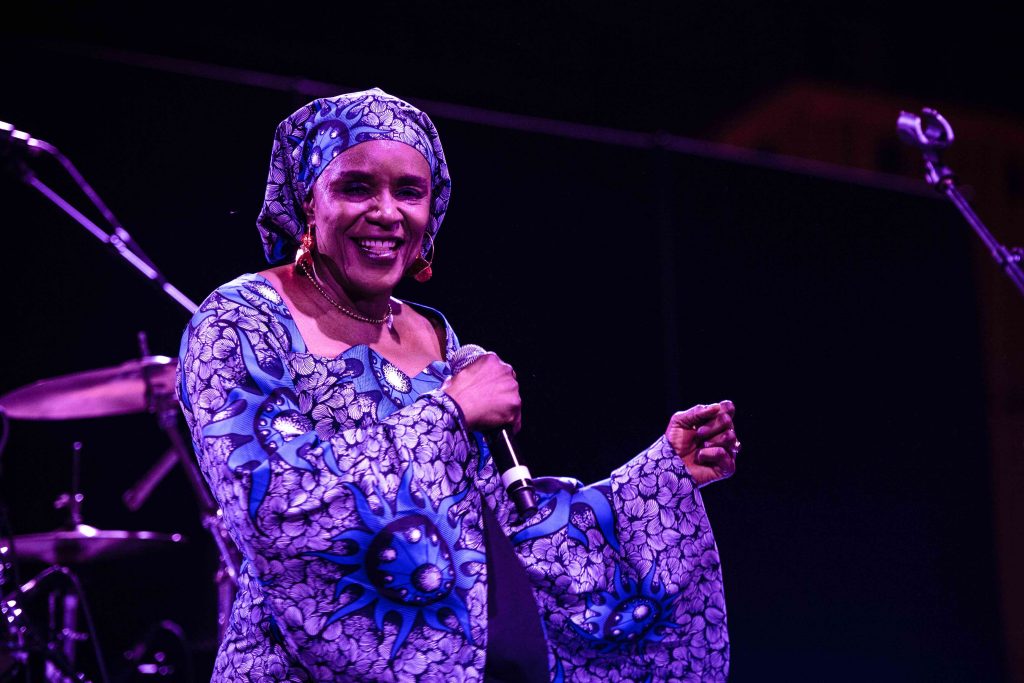The 2022 edition of Llais Festival has been an exciting rollercoaster of events, performances, and talks, and while it is not yet all over – some of the exhibitions and immersive experiences will remain open well into November, and are well worth wandering into the Bay for – my personal Llais adventure definitely ended on a high note with one last visit to the BBC Hoddinott Hall on Sunday night, to attend a performance which displayed better than anything else possibly could the truly international outlook this festival has been able to bring to Wales.
(Image Polly Thomas)
It has always been somewhat of a limitation for some festivals in Wales and elsewhere in the UK that they have been hyperfocused on local culture, losing sight of the myriad of possible connections and conversations to be had when we broaden our borders, and so it is an absolute pleasure to see Llais include such a varied roster of international artists while also championing Welsh voices, demonstrating that this is not an either/or choice and that voices from different background end up amplifying each other and talking to each other in a way that enriches all parties involved. In this light, it was perhaps fit that my personal attendance of the festival ended in an evening that celebrated two very different voices of African music, with two thrilling performances by Les Amazones d’Afrique – an all-female collective of musicians from West Africa bringing to the stage a blend of traditional rhythm and modern pop, and using music as a vehicle to raise important issues of gender equality – and by Vieux Farka Touré, celebrated Malian guitarist and one of the most impressive performers in the African Fingerstyle guitar genre.
(Image Simon Ayre)
Both performances stood out for their technical complexity and impressive delivery. The remarkable layering in the music of Les Amazones d’Afrique, and their ability to blend sounds that were distinctively pop-rock, and more specifically blues, with rhythms and compositional patterns drawn straight from the traditions of West Africa, made for an instantly recognisable sound that felt immersive, engaging, and full of depth; and the set by Vieux Farka Touré had the audience enthralled by its sheer technical prowess, coupled with a charming ease of delivery that made the musical complexity of the tracks result into an easy-flowing, engaging sound. Both performances, too, brought an energy to the stage that was lively and liberating, but also an element of challenge that the audience was in great need of: by disrupting the classic but stiff format of the audience sitting down in their assigned seats, and asking people to come to the front and engage directly with the music, they required everyone to take active part and experience the performance collectively, rather than simply be passive consumers. It may have been challenging for some, but it was a moment of deep connection between all present and the performers themselves, and certainly food for thought about the way we experience music in general and music from cultures other than our native own in particular. What was especially rewarding about these performances, besides their high artistic quality, was that they truly felt like an exchange, a conversation between cultures which was allowed to happen without any risk of fetishisation or pigeonholing. This is, sadly, not always guaranteed, and Llais Festival is to be praised for creating a context in which it could happen with such ease and on such a deeply sincere emotional level.
Over the three days that I have attended it, Llais Festival has offered a wealth of experiences broadly different from each other, which will appeal to an equally broad audience attending the Wales Millennium Centre to find their own interpretation of the concept of music and voice; but this is the one that will linger and stay with me the most. In equal parts joyful and thought-provoking, it was a perfect example of the best music can achieve as a collective language capable of overcoming any barrier to communication.
More Llais reviews:

